Did you know that doctors have conjectured that certain foods could possibly trigger or worsen attention-deficit hyperactivity disorder (ADHD) symptoms?
Although research studies are limited when it comes to the relationship between ADHD and certain foods, there is some agreement amongst pediatricians, child psychologists, researchers, and clinical child social workers that some foods may trigger ADHD-like behaviors or exacerbate current ADHD symptoms. [1]
These foods, according to most experts, are incapable of causing this condition, but some evidence suggests that certain nutritional deficiencies may intensify ADHD symptoms in some children. [1]
Most early studies have been unable to definitively conclude that increasing a child’s consumption of certain nutrients will reduce ADHD symptoms and/or improve his/her behavior. [1]
More research is needed in this area to pinpoint the true relationship between certain foods and ADHD.
However, experts recommend that children with ADHD adopt a healthy diet consisting of lots of water, fruits, vegetables, low-fat dairy, whole grains, protein sources like beans, fatty fish, skinless chicken and turkey, and lean red meat so that their bodies and minds are as healthy as possible. [1]
It is also recommended that you reduce or eliminate certain unhealthy foods from your child’s diet to prevent ADHD “flareups.”. [1]
So, what should you do if your child’s ADHD symptoms have been increasing in frequency and severity?
I often recommend to parents of children with ADHD that they start an elimination process, replacing unhealthy foods that could trigger ADHD activity with healthy alternatives like gluten-free foods, and fresh fruits and vegetables.
I know it’s hard to deprive your child of their favorite comfort foods and snacks, but it may be necessary to reduce some of your child’s symptoms. My goal, as a child and family psychologist, is to maximize the health and well-being of children, so I tend to take a holistic approach to help children better manage their conditions.
It is important to note that nutritious foods should never be a substitute for your child’s prescribed treatment plan. It is equally important not to restrict your child’s diet unless you have consulted with their doctor first.
Children need certain nutrients to grow, develop, and thrive, so if you restrict your child’s diet so much that they become vitamin or mineral deficient, you risk intensifying their ADHD symptoms instead of easing them.
With a tailor-made treatment program and healthy foods, it is possible for your child to take control of his/her ADHD symptoms.
Table of Contents
- 1. Pepsi, Caffeinated Sodas & Caffeinated Energy Drinks
- 2. Food Dyes & Preservatives
- 3. Frozen Fruits & Veggies
- 4. Mercury-Based Fish & Seafood
- 5. Refined and Artificial Sugar (Cake Batter, Frosting & Candy)
- 6. Wheat, Peanuts, Milk, Eggs, Fish, Chocolate, Soy, Shellfish & Other Allergens
- 7. Apples & Other Salicylates
- 8. Lunchables
- 9. Ice Cream & Other Dairy Products
- 10. Pasta Noodles & Other Gluten Foods
- 11. Margarine, Biscuits, Pies, Donuts, Cakes & Cookies
- 12. Deli Meat & Cheese
- 13. Capri Suns & Other Boxed Juices
- In Summary….
1. Pepsi, Caffeinated Sodas & Caffeinated Energy Drinks

If your child has ADHD, you may want to eliminate Pepsi and caffeinated energy drinks from their diet. [2] These beverages not only have large amounts of high fructose syrup (sugar) in them, but they also contain a lot of caffeine (a stimulant) and little-to-no nutritional value.
Because sodas like Pepsi have large amounts of sugar and caffeine in them, they may worsen ADHD symptoms. [2]
Excessive amounts of sugar and caffeine can cause hyperactivity and inattention (absentmindedness) in both children with or without ADHD. [2]
In fact, a 2013 study on caffeinated sodas and behavior found that children who drink caffeinated sodas on a regular basis are more likely to exhibit ADHD-like behaviors like inattention, hyperactivity, impulsivity, and aggression than those who do not drink these beverages on a regular basis. [3]
If your child refuses to give up their sodas, try to replace them with non-caffeinated ones like Sprite or 7-Up. Another good alternative is soda water with a couple of drops of 100% juice in it.
Note: Caffeinated sodas are not good for adults, less so for teens, and absolutely terrible for children, so if you decide to give your child these energy-provoking beverages, please exercise caution.
Then, there are energy drinks, which are becoming more and more popular, especially amongst teens. While they are not good for adults, teens with or without ADHD should be restricted from consuming them.
These drinks have extremely high levels of caffeine in them, along with tons of sugar, artificial colors and sweeteners, and preservatives, all of which may worsen ADHD symptoms in some children. [2] Plain and simple – they’re just not good for anyone, but they are particularly bad for teens with ADHD. [2]
Energy drinks like Monster, Rockstar, Verge, or Red Bull can trigger ADHD-like behaviors (i.e. hyperactivity and recklessness) in some teens, so it’s important to exercise caution before purchasing these beverages. [2, 10] So, what can you give your teen, if he/she wants more energy?
Well, I’d start with healthy alternatives like fruit smoothies, chocolate-covered frozen banana pieces, 100% fruit/veggie juice combos, matcha green tea, iced green chai tea, or clear Gatorade.
2. Food Dyes & Preservatives
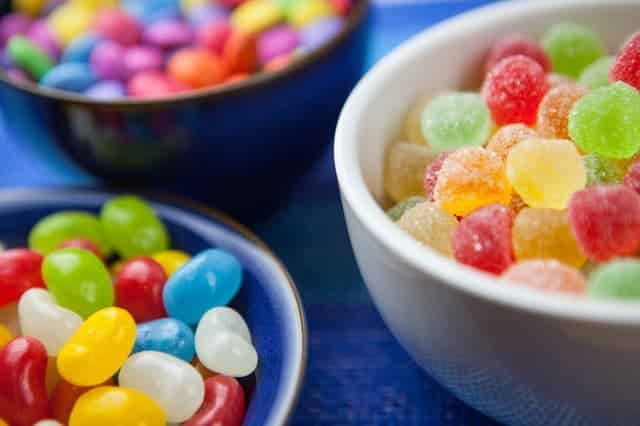
If your child has ADHD, you may want to reduce or remove food dyes and preservatives from their daily diet. Studies show that artificial colors (food dyes), flavors, and preservatives like sodium benzoate can trigger hyperactivity in some children. [2, 8, 9]
In fact, a 2014 study on food additives and behavior found that food dyes can negatively affect behavior in some children [8].
Surprisingly, you can also find sodium benzoate in other foods such as canned soups, salad dressings, condiments like ketchup and mustard, and even carbonated drinks! Other preservatives that may be harmful to children with ADHD include butylated hydroxytoluene, sodium nitrate, butylated hydroxyanisole, and tert-Butylhydroquinone. [2]
Always check the labels before you purchase foods for your child, and if possible, stick to fresh, preservative-free, additive-free, organic foods.
3. Frozen Fruits & Veggies
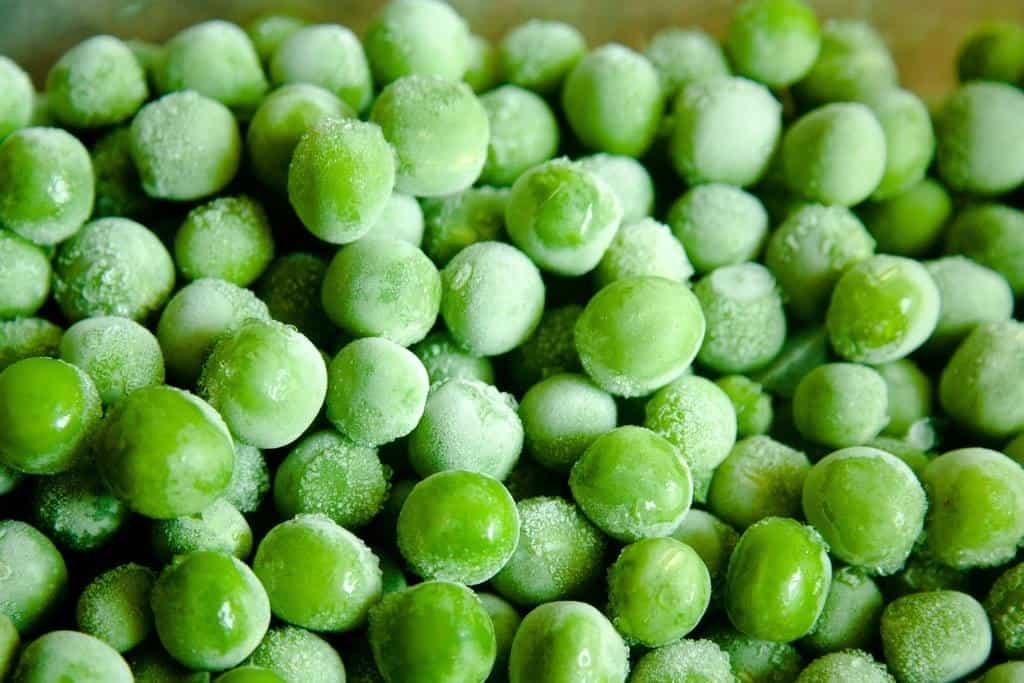
Note: Some frozen foods contain organophosphates, a pesticide used to control bugs, which has been shown to cause neurological-based, ADHD-like symptoms and behavioral problems in some children. [2, 5] So, check labels before purchasing these foods for your child, and if possible, stick to fresh, organic fruits and veggies.
4. Mercury-Based Fish & Seafood

Although cold-water, fatty “omega-3” fish like salmon, tuna, and sardines are beneficial for some children with ADHD (i.e. reducing symptoms), fish and seafood that contain mercury may intensify these symptoms over time. [2]
Why? Well, because mercury (a metal) is not only hard to metabolize (digest), it can also accumulate in your child’s brain, leading to neurological changes – i.e. inattention, and hyperactivity. [6]
So, if possible, refrain from feeding your child mercury-based fish and seafood (i.e. shark, swordfish, and king mackerel) and stick to low-mercury foods like salmon, shrimp, canned light tuna, and catfish.
5. Refined and Artificial Sugar (Cake Batter, Frosting & Candy)

Although the jury is still out as to whether or not sugar triggers or worsens ADHD symptoms, it is apparent that it can increases some children’s energy (at least temporarily), causing them to become jittery and “overly active.” [2] Therefore, restricting your child’s consumption of sugar (refined and artificial) just makes sense.
You can monitor the sugar and high fructose syrup values in your child’s foods by checking the labels.
Reduce or eliminate artificial sweeteners from your child’s diet. Why? Well, because these “alternative sweeteners” contain properties that may trigger inflammation, although results have not definitively proven this claim. [11, 12]
Almost all kids love “licking the bowl” when you make a cake. However, if your child has ADHD, this may not be the best thing to allow him/her to do. Cake mixes and frostings are sugar-loaded.
They also contain artificial colors (food dyes), preservatives, and artificial flavors, all of which may trigger or worsen ADHD-like symptoms (i.e. hyperactivity, a lack of focus and concentration, and/or impulsivity).[2]
Instead of allowing your child to indulge in cake batter and frosting, you can distract them with something else, like their favorite cartoon. Or, limit how much cake and icing your child consumes by cutting them a small piece of cake with minimal frosting.
Candy is another ADHD antagonist. Candy is a “no-no” for some children with ADHD because it is loaded with dyes, preservatives, and SUGAR. And, as you probably guessed, there is a real chance that these ingredients may trigger ADHD-like symptoms or aggravate current ones. [2]
A 2007 study on food additives and hyperactivity in toddlers and school-age children found that foods, including candy, that contain food additives can lead to behavioral issues in some children. [4]
Therefore, try to offer your child organic, fruit-based candy or candy alternatives like yogurt covered banana pieces, fresh fruit popsicles or homemade trail mix.
If your child or teen tells you he/she is craving something sweet, encourage them to grab a sweet fruit like pineapple, pear, apple, papaya, cherry, mango, blueberry, orange, or banana instead. The sugar found in fruits is a healthy alternative to refined sugars because they provide your child with energy without the empty calories.
6. Wheat, Peanuts, Milk, Eggs, Fish, Chocolate, Soy, Shellfish & Other Allergens

It’s important to note that while healthy foods like milk, eggs, soy, fish, peanuts, and even wheat may benefit some children with ADHD, others may experience more intense symptoms if they are hypersensitive or allergic to these allergens.[2] So, exercise caution when giving your child these foods.
Keep in mind that most children exhibit food sensitivities/allergies (manifested in the form of ADHD-like symptoms) after they have been exposed to specific foods. [2] Other food allergens that may cause a reaction in children with ADHD are: tree nuts, beans, corn, grapes, tomatoes, and citrusy foods like oranges. [2]
If you suspect that food allergens are impacting your child’s ADHD symptoms, consult their doctors and ask about eliminating certain foods from their diet.
7. Apples & Other Salicylates

Salicylates are plant-based chemicals that are commonly used in aspirin, other pain-relieving meds – and apples! [14, 16] So, when does an apple a day not keep ADHD symptoms at bay?
Well, when your salicylate-sensitive child bites into a juicy red (or green) apple. And, guess what? This chemical is not only found in apples; they can also be found in cranberries, tomatoes, almonds, and even grapes! [16]
Salicylates are found in aspirin and other pain medications. In fact, a recent study on salicylates and ADHD symptoms in children found that these symptoms could be improved in some children simply by removing food additives and salicylates from their diets. [15, 16]
So, before you give your child any food, make sure it doesn’t have salicylates in it that could trigger or worsen his/her ADHD symptoms.
8. Lunchables
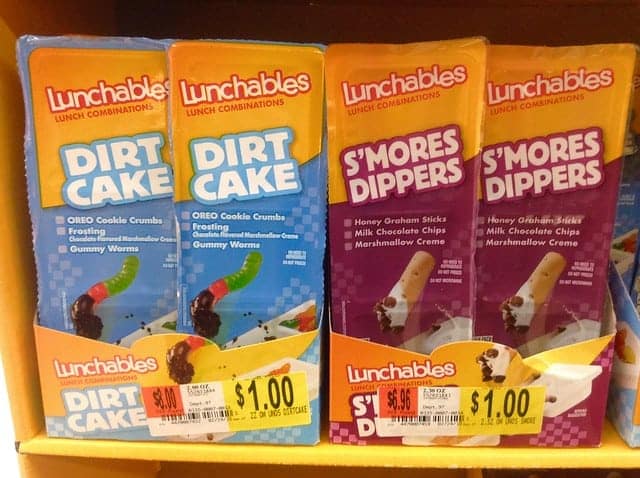
Truthfully, “Lunchables” are unhealthy for any child, but they are especially unhealthy for children with ADHD.[16, 17] Why? Well, because they are “processed lunches” that are loaded with deli meat, food additives, fillers, preservatives, artificial colors and flavors, and sodium, all of which can negatively affect children with ADHD. [16, 17]
Experts suggest that food additives and preservatives like the ones found in “Lunchables” may increase hyperactivity, impulsivity, and inattention in some children with ADHD. [16, 17]
Therefore, it is recommended that children with ADHD remove any foods and beverages that contain food dyes, preservatives, high levels of sodium, and artificial colors and flavors, in favor of wholesome, preferably organic foods.
9. Ice Cream & Other Dairy Products

Ice cream and other dairy products like milk, cheese, sour cream, and yogurt can also intensify ADHD symptoms in some children. [17] Some children are sensitive or allergic to cow’s milk, and cow’s milk can cause inflammation in some people. [17] Inflammation has been linked to behavioral and attention span problems.[17]
According to a 2011 study on the effect of food sensitivities, specifically, the casein found in cow’s milk, on ADHD symptoms in children, removing cow’s milk from the diets of children may lead to an improvement in focus, concentration, and behavior. [17]
In addition, researchers found that approximately 64% of pediatric ADHD cases stemmed from a food sensitivity, and once the “culprit” was removed from the child’s diet, his/her condition improved. [17]
Switch out these “trigger foods” with soy-based or almond-based dairy products (i.e. Almond Dream Toffee Almond Fudge ice cream, Ben and Jerry’s Chunky Monkey ice cream, Blue Diamond Almond Breeze milk, Kite Hill Vegan Chive Cream Cheese, etc.) the next time your child asks for ice cream or other dairy products.
10. Pasta Noodles & Other Gluten Foods
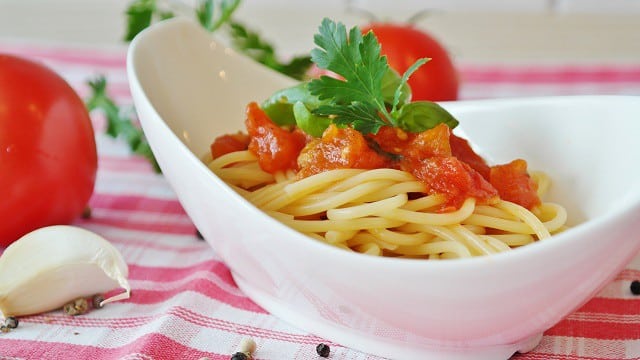
Pasta has long been a favorite childhood food staple. However, the noodles may be aggravating your child’s ADHD symptoms. This is because most pasta noodles contain gluten, which is linked to increased ADHD symptoms in some children.
In fact, researchers are now starting to link ADHD symptoms to gluten sensitivity. More specifically, it appears that a high number of children with ADHD are also sensitive to gluten.
So, if your child’s pediatrician determines that he/she is sensitive to gluten, remove these foods (including pasta noodles) from his/her diet. The good news is that your child can be diagnosed with gluten sensitivity directly from a simple blood test run at the doctor’s office.
If it is determined that your child is gluten sensitive, you may want to eliminate all gluten foods, including wheat, barley, rye and yes, pasta noodles from his/her diet, and opt for only gluten-free foods.
Note: Some packaged and processed foods have gluten as a hidden food additive, so beware.

These unhealthy fats may trigger ADHD-like symptoms or exacerbate current symptoms in some children. Hydrogenated oils and trans fats are unhealthy for everyone, but especially for growing and developing children.
Hydrogenated oils disrupt healthy nerve function, inflame the body, trigger hyperactivity and inattention, increase your child’s risk of obesity, and they may clog arteries, possibly leading to a host of health problems like high blood pressure, migraines, and/or heart issues.
Note: Even if the food label says “no trans fat,” check to see if the food contains partially hydrogenated oils. Some food manufacturers make it seem like there is only minimal trans fat in a food, but the thing is, all it takes is two or more grams a day to become unhealthy.
For instance, if there is 1 gram of trans fat in a food and that food contains 3 or 4 servings per container, it can become unhealthy for your child really quickly. As a result, I often recommend to the parents of my young clients with ADHD that they reduce or avoid products that have even a semblance of hydrogenated oil or trans fat in them.
Healthy alternatives to sweet treats include things like maple cinnamon applesauce, homemade carrot cake oatmeal cookies, yogurt parfaits, banana peanut butter ice cream, and/or fresh mango ice cream.
12. Deli Meat & Cheese
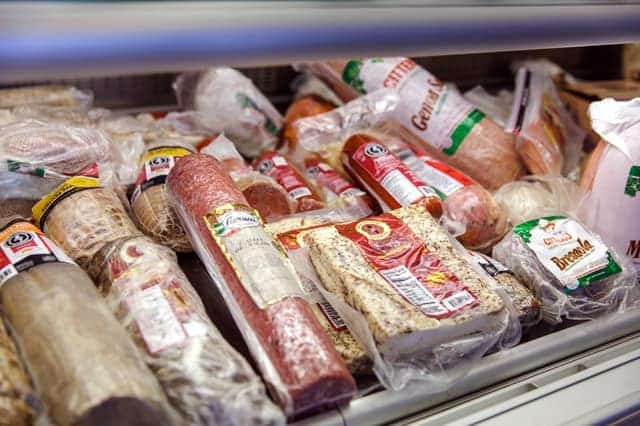
Fixing a sandwich for your child with deli meat and cheese may affect their ADHD symptoms. Deli meats and cheeses just aren’t good for you or your child, because they are processed foods that are loaded with food dyes, preservatives, and sodium! [17]
In fact, many ADHD experts list deli foods as the worst foods a person with ADHD can eat.
[17] According to recent studies, children who consume a large amount of processed foods have a higher risk of developing ADHD. [17]
Therefore, researchers suggest that there is a definite link between ADHD and processed foods. [17] Because processed foods contain high levels of sodium and food additives, consuming them too often can lead to inflammation and behavior and cognitive issues in some children. [17]
If possible, refrain from serving your growing and developing child deli meats and cheeses, and opt for healthier versions like a roast beef sandwich that you made from a pot roast or chicken or turkey wraps made with pieces of “real” roasted or baked chicken and turkey. Oh, and don’t forget to serve your child lots of fresh fruits and veggies too!
13. Capri Suns & Other Boxed Juices
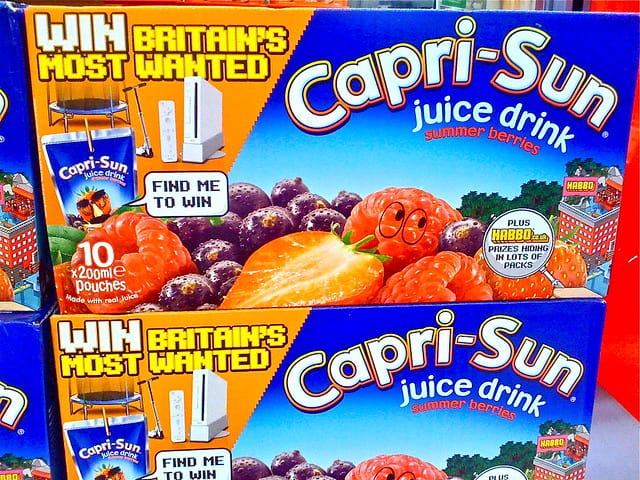
Most kids love Capri Suns and other boxed juices, and most parents love them just as much – for their fussy and thirsty children – mainly because they are easy and portable. But, if your child has ADHD, you may want to find another type of beverage to give him/her, because these “go-to” drinks may be intensifying your child’s symptoms.
The thing about these juices is that they contain a lot of sugar, and most don’t even contain “real fruit juice,” despite their claims.
Most of these boxed juices are just as harmful as sodas when it comes to calories, sugar, food dyes, and preservatives. The best solution? Water. Water is calorie-free and healthy. What should I do if my child refuses to just drink water?
Well, I recommend that you look for beverages that are low sugar (especially high fructose sugar) and sodium, and ones that are 100% real fruit juice.
In Summary….
Although ADHD usually arises during childhood, it doesn’t have to take over your child’s life.
With a proper diagnosis, effective treatment, and proper management with medications, cognitive-behavioral counseling, a healthy diet, proper rest, stress management techniques, and/or regular exercise, your child can go on to live a happy, successful and productive life. [16]
Keep in mind that 60% of children with ADHD have the condition when they become adults, so ADHD management should be on-going. [16]
It is also important to understand that adults with ADHD have a higher risk of also developing anxiety, depression, and other mental health conditions. [16]
Therefore, it is imperative that you seek treatment for your child as early as possible and that you maintain this treatment for however long he/she needs it. The sooner you can wrangle your child’s symptoms under control, the more likely it is that they will become a successful adult. [16]
So, work with your child’s doctor to remove “ADHD trigger foods” from his/her diet, and replace them with healthy foods that may help ease his/her symptoms.
And, remember, research studies on the relationship between foods and ADHD are limited at this time, so there is no guarantee that removing certain foods and/or adding others will ease or “cure” your child’s ADHD symptoms.
Still, it’s always better to be healthy than unhealthy – especially if you’re a child.
References:
- Myers, W. (2018). 7 foods to avoid if your child has ADHD. Everyday Health.
- Everyday Health. (2018). ADHD symptoms may be caused by food sensitivities.
- Suglia, S. F., Solnick, S., & Hemenway, D. (2013). Soft drinks consumption is associated with behavior problems in 5-year-olds. The Journal of Pediatrics, 163(5), 1323-1328.
- McCann, D., Barrett, A., Cooper, A., Crumpler, D., Dalen, L., Grimshaw, K., Kitchin, E., Lok, K., Porteous, L., Prince, E., Sonuga-Barke, E., Warner, J. O., & Stevenson J. (2007). Food additives and hyperactive behaviour in 3-year-old and 8/9-year-old children in the community: A randomized, double-blinded, placebo-controlled trial. Lancet, 370(9598), 1542.
- Sánchez Lizardi, P., O’Rourke, M. K., & Morris, R. J. (2008). The effects of organophosphate pesticide exposure on Hispanic children’s cognitive and behavioral functioning. Journal of Pediatric Psychology, 33(1), 91-101.
- Goodman, B. (2012). Kids exposed to mercury, lead at risk for ADHD. WebMD.
- Vale, H. (2017). Children with ADHD: Foods to avoid. Livestrong.com.
- Stevens, L. J., Burgess, J. R., Stochelski, M. A., & Kuczek, T. (2014). Amounts of artificial food dyes and added sugars in foods and sweets commonly consumed by children. Clinical Pediatrics, 54(4), 309 – 321.
- Stevens, L. J., Burgess, J. R., Stochelski, M. A., & Kuczek, T. (2013). Amounts of Artificial Food Colors in Commonly Consumed Beverages and Potential Behavioral Implications for Consumption in Children. Clinical Pediatrics, 53(2), 133 – 140. Retrieved from
- Seifert et al. (2011). Health effects of energy drinks on children, adolescents, and young adults. Pediatrics, 127(3), 511–528.
- Wolraich, M. L. (1988). Aspartame and behavior in children. Boston: Birkhauser, 201-206.
- Wolraich, M. L., Lindgren, S. D., Stumbo, P. J., Stegink, L. D., Appelbaum, M. I., & Kiritsy, M. C. (1994). Effects of diets high in sucrose or aspartame on the behavior and cognitive performance of children. New England Journal of Medicine, 330, 301-307.
- Butler, A., Van Lieshout, R. J., Lipman, E. L., et al. (2018). Mental disorder in children with physical conditions: A pilot study. BMJ, 8.
- WebMD. (2018). What is a salicylate allergy?
- Joneja, J. M. (1996). Diet and behaviour – Myth or science? Journal Of The Canadian Child Psychiatric Bulletin, 5(1), 4-11.
- Hoppe, J. & Goldman, R. (2017). 5 Food items to avoid with ADHD. Healthline.
- Pelsser, L. M., Frankena, M., Toorman, J., Savelkoul, H. F., Haagen, T. A., Rommelse, N. N., Buitelaar, J. K. (2011). Effects of a restricted elimination diet on the behaviour of children with attention-deficit hyperactivity disorder (INCA study): a randomized controlled trial. Lancet, 377 (9764), 494-503.



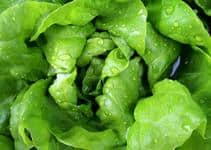

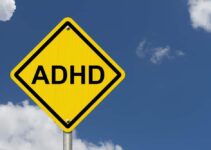



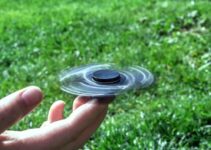

I was diagnosed as an adult at 41. In now 50. ADHD is running rampant in my life now. I was allergic to EVERY THING as a child. I felt like the kid in a bubble who couldn’t eat anything. I learned to eat a little here and there. Now my symptoms are crazy. After reading this article, I guess I need to go back to a minimalist diet – sugar free, gluten free, soy free, non dairy, non fried, carb free,& only water for hydration. How boring…. But I’ll be less sick, slowly dying, more focused, and healthy. Thanks.
the section about caffeinated sodas is BS. Caffeine is a stimulant, as is most medications used to treat ADHD. Caffeinated drinks can mimic the effects of stronger stimulants at a lower level than something like Ritalin. It’s just sad that a site like this will post an article like this without doing the proper research into a topic like that I can see that some people would even take caffeine out of their diet after reading this just because it’s some sort of trusted site. This also renders the part about energy drinks false as well, although I do agree that some sweeteners can cause increased effects of ADHD (there seems to be something in sprite that triggers mine) that does not mean there are not alternatives. All thin information can be found by making a quick google search about the effects of caffeine on someone who has adhd.
Very disappointing.
I agree with you. I know some parents who used caffeine to calm their children with ADHD. When I was a kid, caffeine had an adverse reaction on me. I would be really calm after drinking coffee!
Honestly as a person with ADHD most of this is BS. Especially the sugar/candy part and the part about fruit. Sour fruits and acidic candies are extremely important in reducing ADHD symptoms and allowing us to focus. It’s called stimulation. Chewing on sour things can help us focus better the same way a stim toy does.
Well this pretty much leaves me with nothing to eat….
exactly what I was just saying. that list contains everything. I cant think of anything that does not contain 1 or more things on that list. And who has time in this day and age to cook boneless skinless chicken turkey or low fat meats at every meal lets not 4 get dont add butter to your veggies youll have an adhd attack cant have any carbs either so you will basically be hungry all the time and broke meats are not cheap and the lower the fat content of them the more expensive they are. No kid is gonna go for a bland diet like that. hell i dont know of an adult that would. sorry but a little fat, salt or sugar is needed for flavor. (not saying pile that stuff on) but that sounds like a diet from hell. that will leave you broke and tired from prepping meats at every meal.
Yeah if anything this diet is guaranteed to make ADHD symptoms worse from lack of stimulation. The only food that’s genuinely bad for people for ADHD is grapefruit because it stops ADHD meds from working.
It may seem that way at first, but there is still an awful lot to eat and avoiding these things makes you feel so much better!
Yo, ADHD person here. No. No it won’t. Please stop. Stop making kids feel like they have to fight the way their brain is wired rather than helping them work around it.
Signed,
Someone who has to actually love with the disorder